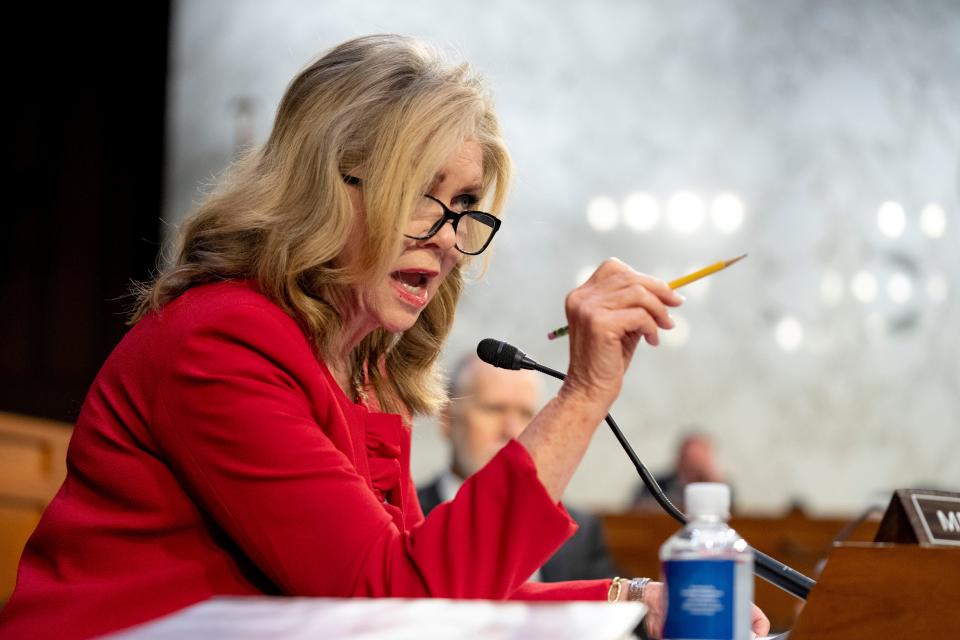Blackburn, Tenn. congressional colleagues champion rural patients, hospitals | Opinion
- Oops!Something went wrong.Please try again later.
Most Tennesseans are unaware, but Tennessee hospitals receive significantly lower reimbursement rates for Medicare patients than hospitals in other states providing the same care. Unfortunately, our health systems know this firsthand. This is in large part because the Centers for Medicare & Medicaid Services use a flawed reimbursement formula known as the Medicare Area Wage Index. Even CMS itself recognizes that the AWI “perpetuates and exacerbates the disparities between high and low wage index hospitals.” The consequence of this problematic formula is that it leads to significant losses year over year when you consider that roughly half of hospital patients are covered by Medicare.

In fact, the losses are so great that rural hospitals are shutting down at record rates. According to the American Hospital Association, between 2010 and 2021, 136 rural hospitals have closed nationwide. Nineteen of these closures occurred in 2020, the most of any year in the past decade. The AHA notes that low Medicare reimbursement rates have resulted in $5.8 billion in Medicare underpayments to rural hospitals, and that these underpayments grew by nearly 40% from 2016 to 2020. These factors have had a devastating toll on hospitals in Tennessee, which has the second-highest number of rural hospital closures in the country.
Hear more Tennessee voices:Get the weekly opinion newsletter for insightful and thought-provoking columns.
In Washington, U.S. Sen. Marsha Blackburn has been a leader we can count on to right these wrongs. Blackburn has consistently worked with bipartisan colleagues to introduce legislation and apply pressure on CMS to help struggling Tennessee hospitals with this challenge.
Most recently, Blackburn spearheaded a letter to CMS that calls for an extension of the Low Wage Index Hospital policy, which corrects the problems caused by the AWI. Sen. Blackburn coordinated with her Democratic colleague, Sen. Mark Warner of Virginia, to pitch their Senate colleagues on the need for an extension of this policy, which is set to expire in September unless CMS acts. The pair persuaded more than a dozen of their bipartisan colleagues, including Tennessee Sen. Bill Hagerty, to join them in advocating directly with CMS. CMS would be wise to listen.
Blackburn has long championed policies that support rural residents’ access to health care. It is not surprising then that Blackburn encouraged her colleagues to support an extension of the LWIH policy because she recognizes its value to Tennesseans. The policy has been a valuable lifeline for more than 800 hospitals in 23 states since 2020, including nearly 75% of all Tennessee hospitals. The support allows hospitals to recruit and retain health care staff and protect access to care, especially in rural areas. Blackburn should be thanked for taking a lead role in working to preserve the policy.
Additionally, Blackburn has for years led and supported Area Wage Index-related efforts and legislation to ensure hospitals are fairly reimbursed for their services by the federal government. This includes Blackburn’s role as lead co-sponsor of the Save Rural Hospitals Act, which would establish an appropriate national minimum for the Medicare Area Wage Index reimbursement rate.
Tennesseans are fortunate to have not only Blackburn but the entire Tennessee congressional delegation fighting for access to rural health care and keeping our local hospitals open. Hagerty and U.S. Reps. Diana Harshbarger, Tim Burchett, Chuck Fleischmann, Scott DesJarlais, Mark Green, John Rose, David Kustoff and Steve Cohen have consistently supported regulatory and legislative solutions on this issue. Even the delegation’s newest member, Rep. Andy Ogles, recently joined a letter to CMS.
All Americans should have equal access to care and not be punished for living in rural areas. We appreciate Blackburn and our congressional delegation for leading the way in Congress to preserve rural hospitals and patient access in Tennessee and across the nation.
Joe Landsman is the president and chief executive officer of the University of Tennessee Medical Center in Knoxville. Hal Naramore, M.D., is the chief executive officer of Blount Memorial Hospital in Maryville. Jim VanderSteeg is the president and chief executive officer of Knoxville-based Covenant Health.
This article originally appeared on Nashville Tennessean: Opinion: Blackburn, colleagues champion rural patients, hospitals

